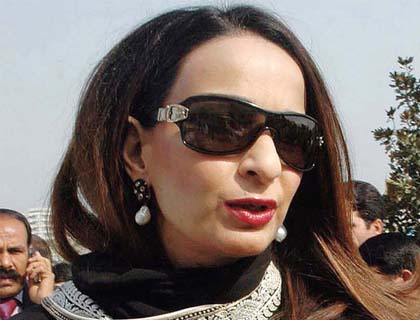Lawmaker for the ruling Pakistan Peoples Party (PPP) and a close aide to the late Benazir Bhutto, charismatic and courageous Sherry Rehman has been appointed Pakistan's new ambassador to the United States. She replaces the embattled former journalist and diplomat Hussain Haqqani. Her appointment comes in the wake of what is now being termed as Pakistan's 'memogate' scandal, where following the Bin Laden raid by US Seals, the now former Pakistani ambassador allegedly on the behest of top civilian officials sent back-channel memos to the then head of US military Admiral Mike Mullen imploring the US to intervene to stop a potential coup against the Asif Zardari led civilian government, offer to cut-off links with Islamic militant outfits as well as remove Pakistani military's top brass – a charge Haqqani (not to be confused with Jalaluddin Haqqani) denies.
Rehman's appointment is a step welcomed by Pakistan's urban liberals who have previously lauded her for her bold and liberal stance on domestic issues including but not limited to spearheading legislations for the empowerment of women, against honor-killings and domestic violence, and most prominently against the country's infamous blasphemy-laws. Her advocacy against the death penalty for a minority Christianwoman, Asia Bibi, on charges of blasphemy placed her in the crosshairs of Islamic fundamentalists and earned her death threats.
On Pakistan's foreign policy front however, Sherry Rehman has been a relative backbencher; where she has been vocal, she has towed the line drawn by Pakistani's security establishment led by its notoriously politics-obsessed military. On Pakistan's Afghan policy for example, a recent report she co-authored offers a window to where she would lead Pakistan's relations with the United States with respect to the conflict in Afghanistan.
The report titled 'Pakistan, the United States and the End Game in Afghanistan: Perceptions of Pakistan Foreign Policy Elite' sets clear policy differences between the nominal allies, Pakistani and the United States. It rolls a diplomatic paint over the policy of "strategic depth" where the Pakistani security establishment considers Afghanistan as its card for political balance and security maneuver upon the occurrence of a conflict with its archrival India.
By approving of her appointment as Pakistan's ambassador and the key link in the all too strategically important relationship with the US, Pakistan military has on the one hand toned down the liberal displeasure with the resignation of Hussain Haqqani, made amendments, for the time being, in its shaky relationship with the PPP-led civilian government, attempted to project an enlightened image of Pakistan in the West and crucially, maintained a key diplomatic channel for its 'strategic depth' venture in Afghanistan.
The research report co-authored by Rehman was released by the US Institute of Peace and the Islamabad based Jinnah Institute, of which she is the founding president. Participants to the report included retired diplomats, politicians, journalists, retired security officials and army generals. They place Pakistan's interests in Afghanistan as squarely 'Indo-centric' and under dictum of the country's security establishment.
They argue for a power-sharing arrangement with Taliban's Quetta Shura and the Haqqani Network, among others, as well as presenting Pakistan preferences in Afghanistan's key security mechanisms such as the size of the Afghanistan National Security Forces and its key appointments. To place it bluntly, it states: Pakistan intelligence links with the Afghan Taliban and the presence of these groups on Pakistani soil are seen as leverage points which more or less guarantee Islamabad's involvement in the end game (in Afghanistan).
It reports Pakistan as the key to any reconciliation program in Afghanistan, where Pakistan "could nudge the main insurgent groups to join and approach the negotiations process sincerely" - or do the exact opposite if it wishes to do so. Guised as the regional advocate for "ethnic balance" in Afghanistan's security and political make-up, the report indicates that Pakistan, contrary to the Western stakeholders, is in Afghanistan for the long-run and should therefore, be made a party to negotiations and reconciliation with the Afghan insurgents.
Despite Osama Bin Laden being killed in a Pakistan garrison town resulting in Pakistan's security insurance cards being expose internationally, the report argued that the event had little to no bearing on Pakistan's interests in Afghanistan, that is, it will continue to pursue adamant relationship with insurgent groups, continue to provide them with sanctuaries, training and logistical support - pursuits later confirmed by the recent BBC report-cum-documentary title 'Secret Pakistan'.
Pakistan now stands at a unique position of simultaneously having women as ambassador to the United States, speaker of the national assembly and federal minister for foreign affairs - an achievement it should be commended and envied for by the nations of the region. One can only hope that Sherry Rehman's domestic liberalism and courage will shine light upon her future policy stands with respect to her country's role in Afghanistan and the region, a paramount task as it may be.
One hopes that Pakistan's civilian government will take charge of all of its foreign policy affairs and break the long and tight grip of its military; a grip that has harmed Afghanistan and has equally damaged Pakistani politics and society.

